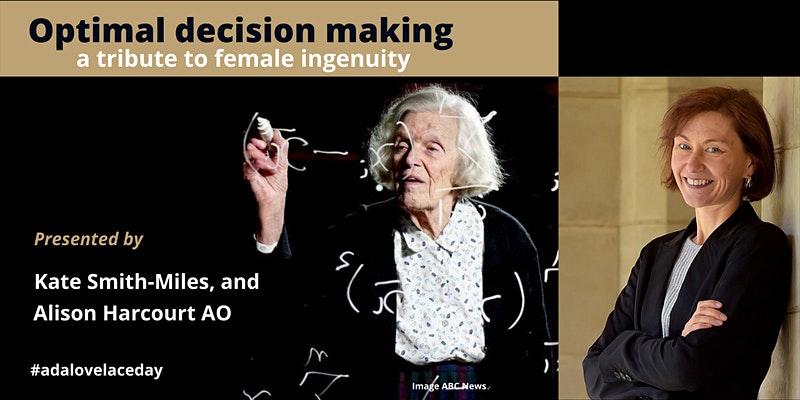Registration for new events has been turned off. Please contact Suw Charman-Anderson if you have an event to add.

- This event has passed.
[ONLINE] Optimal decision making: a tribute to female ingenuity
12 October 2021 @ 12:00 pm - 1:00 pm
Free
ACEMS is proud to host this virtual public lecture celebrating Ada Lovelace Day and the significant contribution of women in STEM.
Optimisation is the branch of mathematics that supports optimal decision-making. Mathematics is needed when there are too many choices available, too many rules to satisfy, and too many goals to be achieved – to find the perfect solution without mathematical help.
In this lecture, Kate Smith-Miles and Alison Harcourt will discuss how everyday decisions – made by governments and corporations, and everyday people when using apps like Google Maps – are powered by optimisation techniques. They will take a whirlwind tour through some of the breakthrough ideas that have enabled optimisation techniques to help us make decisions faster, better, and cheaper.
Some of these breakthrough ideas have been due to female ingenuity, and on this Ada Lovelace Day, we will pay tribute to the game-changing contributions of two more remarkable women – Ailsa Land and Alison Harcourt (née Doig).
Their idea changed the course of optimisation technique development and paved the way for optimisation to have the impact we see in the world today. We will hear Alison tell the tale of their idea and what happened next.
Finally, we will look at the future challenges of optimisation, and the opportunities for new ideas to continue to create an impact in the world.
About the speakers
Kate Smith-Miles is a Professor of Applied Mathematics, Chief Investigator with the ARC Centre of Excellence for Mathematical and Statistical Frontiers (ACEMS), and an Australian Laureate Fellow at The University of Melbourne. She graduated from The University of Melbourne with a BSc(Hons) in mathematics, and a PhD in electrical engineering, before commencing her academic career in 1996 at Monash University. Returning to The University of Melbourne in 2017, she is currently Associate Dean (Enterprise and Innovation) for the Faculty of Science, and Director of the ARC Industrial Transformation Training Centre for Optimisation Technologies, Integrated Methodologies, and Applications (OPTIMA). Passionate about interdisciplinary applications of mathematics, her award-winning research in optimisation, machine learning, and mathematical modelling has found application in many fields as diverse as manufacturing design, epidemiology, computer vision, finance, and stem cell modelling.
Alison Harcourt AO (nee Doig) completed a BA(Hons)(1950), BSc(1952), and MA(1958) at the University of Melbourne, majoring in mathematics and statistics. Alison is a pioneer in the field of optimisation, having co-authored the seminal paper: A. H. Land and A. G. Doig, An Automatic Method of Solving Discrete Programming Problems, Econometrica, vol. 28, no. 3, 1960. This ground-breaking paper is well-known to researchers in optimisation since it proposed a method for solving integer programming problems which later became known as the “branch-and-bound” method. It underpins modern day optimisation software packages that provide efficient solutions to challenging combinatorial optimisation problems. Applications include logistics, transportation, scheduling, telecommunications, and radiotherapy treatment planning.
Alison’s statistical analyses have had profound impacts influencing government policy. Examples include the first attempts to estimate poverty in Australia (informing the 1972 Royal Commission of Inquiry into Poverty, work headed by Professor Ronald Henderson) and, in conjunction with Dr Malcolm Clark, a statistical analysis of bias that led to an amendment of the Commonwealth Electoral Act in 1984. This amendment introduced a ‘double randomisation’ method for allocating positions of political parties on ballot papers, which is still used today.
Alison was foundation secretary of the Victorian branch of the Statistical Society of Australia (1963-1967), and has co-authored two books and written numerous journal articles.
Today, she continues to teach as a sessional tutor in undergraduate statistics subjects at the University.
In 2018, in recognition of her significant achievements and contributions to society, the University of Melbourne awarded its highest honour, the degree of Doctor of Science(honoris causa) to Alison. She was also named the 2019 Victorian Senior Australian of the Year.